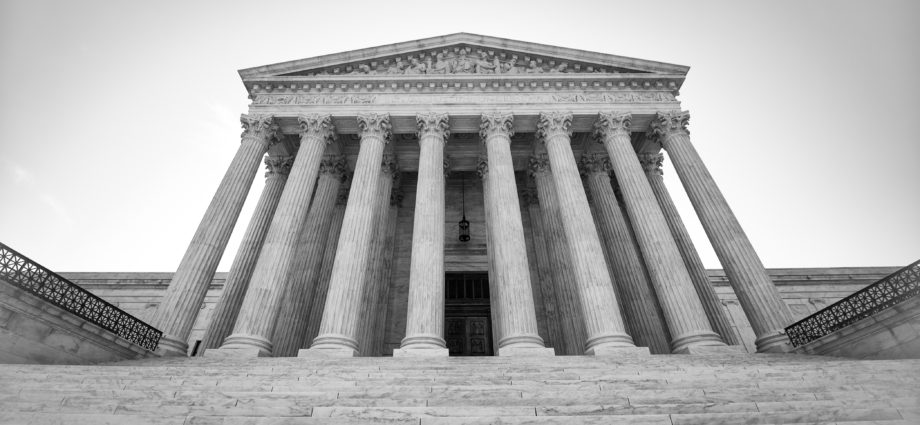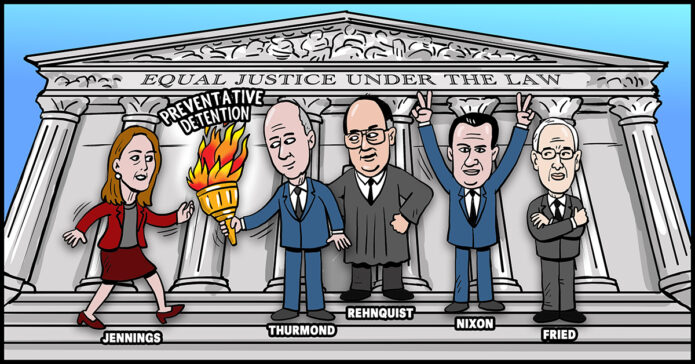Protecting the Fundamental Constitutional Right to Bail; Opposing Preventative Detention Policies

The Eight Amendment provides that excessive bail should not be required. The American Bail Coalition supports the many states that provide that all persons shall be bailable by sufficient sureties. The right to bail forces judges to create the right balance in each case, and should absolutely be maintained. Bail is also often a third-party provided benefit, and thus the right to bail also protects core constitutional rights of association and right to familial and spousal relationships.
The American Bail Coalitions also stands strongly against the expansion of general preventative detention policies. Jurisdictions should not embrace the federal or Washington, D.C. systems of preventative detention. Preventative detention policies have been shown over time to erode constitutional rights, label persons as dangerous for which they may never be exonerated, and are, according to research, ineffective at curbing pretrial crime. In New Jersey, the expansion of preventative detention has been nothing short of astounding with the government now filing motions seeking detention in the majority of all criminal defendants who are arrested. In addition, such policies unnecessarily detain many persons who will appear and will not commit a new crime. In the federal system, more than 70% of all defendants are detained, up from 24% prior to the passage of the Federal Bail Reform Act of 1984.
Surgical and circumspect changes to preventative detention, constitutional provisions or state statutes might be warranted if a case can be made for a certain type of case or crime, i.e., like in California where a specific threat to a witness or victim, proven by clear and convincing evidence may form the basis for preventative detention. No general preventative detention statutes or policies should be implemented, and legislatures should not be passing crime of the week bills to impose detention when the clear need for it has not been demonstrated.
Said Justice Thurgood Marshall in dissent in Salerno:
This case brings before the Court for the first time a statute in which Congress declares that a person innocent of any crime may be jailed indefinitely, pending the trial of allegations which are legally presumed to be untrue, if the Government shows to the satisfaction of a judge that the accused is likely to commit crimes, unrelated to the pending charges, at any time in the future. Such statutes, consistent with the usages of tyranny and the excesses of what bitter experience teaches us to call the police state, have long been thought incompatible with the fundamental human rights protected by our Constitution. Today a majority of this Court holds otherwise. Its decision disregards basic principles of justice established centuries ago and enshrined beyond the reach of governmental interference in the Bill of Rights.
Honoring the presumption of innocence is often difficult; sometimes we must pay substantial social costs as a result of our commitment to the values we espouse. But at the end of the day, the presumption of innocence protects the innocent; the shortcuts we take with those whom we believe to be guilty injure only those wrongfully accused and, ultimately, ourselves. Throughout the world today there are men, women, and children interned indefinitely, awaiting trials which may never come or which may be a mockery of the word, because their governments believe them to be “dangerous.” Our Constitution, whose construction began two centuries ago, can shelter us forever from the evils of such unchecked power. Over 200 years it has slowly, through our efforts, grown more durable, more expansive, and more just. But it cannot protect us if we lack the courage, and the self-restraint, to protect ourselves. Today a majority of the Court applies itself to an ominous exercise in demolition. Theirs is truly a decision which will go forth without authority, and come back without respect.





